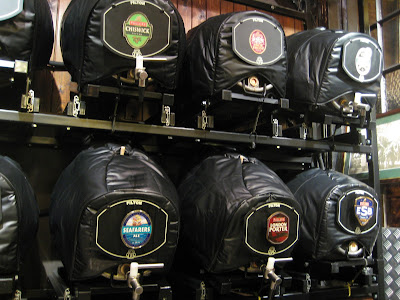Old newspapers and magazines hypnotise me. Pulling away my treacle-sticky eyeballs is hard. You don't want to know how much of my free time is spent enslaved to old publications.
While wandering the corridors of obscurity, I occasionally walk into a lamppost of relevance. This is today's lamppost;
"Protocol was at a minimum when Mr. and Mrs. G. D. Braiton, the manager and his wife of The Anchor, Bankside, received a very distinguished guest for aperitifs and lunch one morning in January. Mingling quite unceremoniously with the throng of lunchtime customers were Comrade Vladimir Promyslov, Moscow's burly mayor, with other members of his staff and officials of the L.C.C., with whom the mayor had been spending a few days on an official visit.The Cold War. I blame that for the total ignorance of Russian drinking habits. My money would have been on whisky. Nice Russian Stout joke, though.
Comrade Promyslov was impressed by The Anchor. "I can see I have been missing something very special", he said, through his two diligent interpreters. Unfortunately, we do not know what he thought of English beer: he drank whisky — not even Russian Stout! But two of his staff seemed to be enjoying the bitter, and they all did excellent justice to a real English meal of asparagus soup, whitebait, roast beef and Yorkshire pudding, and apple pie."
"The Golden Cockerel Vol.3 No.7 Spring 1964", page 19.
I should explain. The Anchor Bankside is the Barclay Perkins brewery tap. (I know "was the Barclay Perkins brewery tap" is more accurate, as the brewery is long gone. In my head, they live on.) Hence the Russian Stout reference.
The barman is rather nattily dressed. They're such scruffs behind the bar nowadays. All jeans, T-shirts and stubble. But it's what behind him that harpooned my eyes: wooden barrels on stillage. Barclay Perkins beers, gravity-served. Maybe Comrade Promyslov was a bit of a Philistine.
Those barrels reminded me of my last time in the Anchor. Late November last year. There were barrels on stillage then.
Asparagus soup: is that typically English? I've been perfecting my Yorkshire puddings. They're tricky little devils to make. Worryingly satisfying when it goes well.
Don't the windows in both pictures look similar?
More misshapen veg from the Golden Cockerel's garden soon.












































































6 comments:
Last time I was in, an Eastern European barman tried to tell me his rancid Marston's Old Empire was a new cask, until the duty manager was summoned to condemn it. Does that suggest some kind of symmetry?
Use beef dripping as the fat and get the oven very hot.
Ed, the right flour is just as important.
I use sunflower oil, heated it to 220º C while the meat roasts.
The right balance of milk and water is key to getting them fluffy inside but crisp outside.
Yorkshire pudding is one of my favorite foods, though I often make it from the drippings of pan frying English sausages. Get drippings really hot, add in batter and sausages, bake. Mmmmm.
Is this what would be called 'toad-in-the-hole?"
Both the pan and the grease need to be piping hot. I preheat the pan and the grease in the oven up to 450F. Using shortening, I know it's about ready right when the grease seems about to smoke. My batter is 125g flour, 2 eggs, 150mL cold water, 150mL cold milk, salt & pepper to taste. Mix super well with electric mixer and allow to rest while oven is preheating (can be about 20 minutes). When the pan is hot, pull it out of the oven, pour the batter in there (it will start to sizzle) then put it back in the oven for 30 minutes.
I'm with Ed on this. Beef dripping & v. hot oven. You can get good dripping a fair bit hotter than sunflower oil will go. But then , I learned from my grandma and hers were a bit on the low side, not the billowing cumuli that we seem to favour nowadays. The Royal Society of Chemists have a good recipe and method
Post a Comment